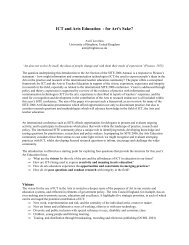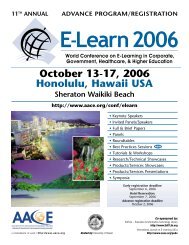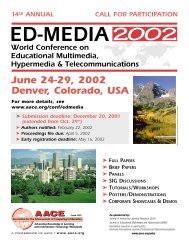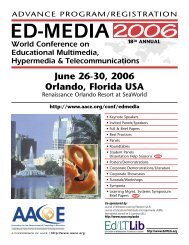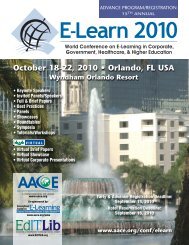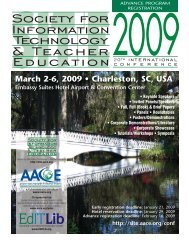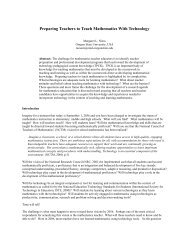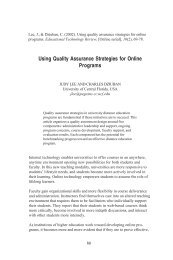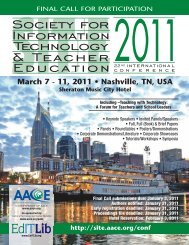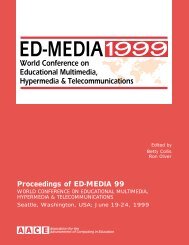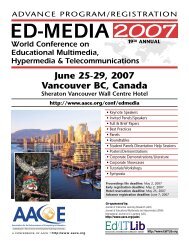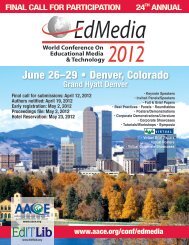ED-MEDIA 1999 Proceedings Book - Association for the ...
ED-MEDIA 1999 Proceedings Book - Association for the ...
ED-MEDIA 1999 Proceedings Book - Association for the ...
You also want an ePaper? Increase the reach of your titles
YUMPU automatically turns print PDFs into web optimized ePapers that Google loves.
more in<strong>for</strong>mation about it, <strong>for</strong> example, <strong>the</strong> merits or <strong>the</strong> demerits and so on.<br />
Questions, <strong>the</strong> response and <strong>the</strong> metacognition<br />
Useful metacognitive experiences may be engendered by communication loosely and broadly<br />
defined. Metacognitive experience may be engendered by paraphrasing, finding examples, or asking<br />
questions about what we have tried to comprehend in order to find out how correctly and fully we have<br />
comprehended it (Flavell 1981). These actions are communicative attempts to talk to ourselves or to<br />
o<strong>the</strong>rs. There<strong>for</strong>e <strong>the</strong> learners’ questions and tutors’ responses are related to <strong>the</strong>ir metacognitive experience<br />
(Kayashima 1998).<br />
Additionally, Artzt & Armour-Thomas have claimed <strong>the</strong> difficulty in problem solving may lie in<br />
a student’s inability to actively monitor and subsequently regulate <strong>the</strong> cognitive process engaged in during<br />
problem solving (Artzt & Armour-Thomas 1992). They reported that <strong>the</strong> group that did not solve <strong>the</strong><br />
problem consisted of <strong>the</strong> members who had <strong>the</strong> lowest percentage of episodes at <strong>the</strong> metacognitive level<br />
and highest percentage of episodes at <strong>the</strong> cognitive level. Based on Flavell’s idea mentioned above, we<br />
could rephrase <strong>the</strong>ir results as follows: <strong>the</strong> communication between <strong>the</strong> members, who belonged to <strong>the</strong><br />
group that did not solve <strong>the</strong> problem, could not engender <strong>the</strong>ir metacognitive experiences.<br />
On <strong>the</strong> contrary, <strong>the</strong> communication between <strong>the</strong> members, who belonged to <strong>the</strong> group that<br />
solved <strong>the</strong> problem, could engender <strong>the</strong>ir metacognitive experiences. Their metacognitive experiences<br />
affected <strong>the</strong>ir cognitive objectives and <strong>the</strong>ir cognitive actions; thus <strong>the</strong>y were able to solve <strong>the</strong> problem.<br />
Hence, we try to analyze <strong>the</strong> learners’ questionings and <strong>the</strong> tutors’ responses from <strong>the</strong> viewpoint<br />
of <strong>the</strong>ir metacognitive experience in order to verify how <strong>the</strong> interactions between learners and tutors<br />
develop <strong>the</strong>ir metacognitive experiences.<br />
Questions represent learners’ immediate antecedent action of questionings<br />
We categorized learners’ questions into “questions that request in<strong>for</strong>mation” and “questions that<br />
confirm interpretation”. Questions that request in<strong>for</strong>mation are those that ask o<strong>the</strong>rs to state <strong>the</strong>ir<br />
knowledge in a way that <strong>the</strong> questioner can comprehend ef<strong>for</strong>tlessly. For example, “Let us know about..."<br />
These types of questions asked tutors to explain “simply” or “so I can comprehend ef<strong>for</strong>tlessly”. These<br />
show that learners were aware that <strong>the</strong>y did not have some basic necessary knowledge. In o<strong>the</strong>r words,<br />
<strong>the</strong>se questions imply that <strong>the</strong> immediate antecedent of <strong>the</strong>se questionings could be metacognitive<br />
experience: monitoring, and in particular, awareness.<br />
However, <strong>the</strong> response of <strong>the</strong> tutors to questions that requested in<strong>for</strong>mation caused, in some<br />
cases a trans<strong>for</strong>mation of <strong>the</strong> questions into ones that desired to confirm interpretation. These types of tutor<br />
responses were characterized by criticisms upon learners’ cognitive actions and subsequent suggestions<br />
about <strong>the</strong>se same cognitive actions. This trans<strong>for</strong>mation implies that learners’ predictors of <strong>the</strong> state of<br />
<strong>the</strong>ir understanding trans<strong>for</strong>med from ignorant noncomprehension into a degree of comprehension, though<br />
somewhat untrustworthy, that evidenced growth of constructive knowledge. This is evident because <strong>the</strong><br />
questions that confirm interpretation are questions that learners ask in order to confirm <strong>the</strong>ir own state of<br />
understanding. For example, one of <strong>the</strong> students in <strong>the</strong> study, who engaged in learning about <strong>the</strong> binary<br />
system, asked <strong>the</strong> following: “I suppose that all in<strong>for</strong>mation is represented as one or zero. If so, is hiragana<br />
or katakana represented as one or zero” The latter questions imply that learners attempted to seek out<br />
criterion that referenced evidence of <strong>the</strong>ir comprehension. That is, although <strong>the</strong> questioners monitored <strong>the</strong><br />
state of <strong>the</strong>ir understanding, <strong>the</strong>y could not evaluate <strong>the</strong> trustworthiness. There<strong>for</strong>e <strong>the</strong> immediate<br />
antecedent of <strong>the</strong>se questionings could be also metacognitive experience, i.e. monitoring.<br />
In <strong>the</strong> above-mentioned questions, <strong>the</strong> immediate antecedent is monitoring. However, as far as<br />
<strong>the</strong> criterion referenced evidence of cognitive progress is concerned, <strong>the</strong> <strong>for</strong>mer monitoring is different<br />
from <strong>the</strong> latter monitoring at a certain level. The <strong>for</strong>mer monitoring is evidenced by <strong>the</strong> learner<br />
per<strong>for</strong>ming monitoring functions without <strong>the</strong> criterion-referenced evidence. The learner attempting to<br />
monitor with criterion-referenced evidence characterizes <strong>the</strong> latter monitoring. There<strong>for</strong>e <strong>the</strong> latter is at a<br />
higher level than <strong>the</strong> <strong>for</strong>mer. Hence, <strong>the</strong> latter learner might develop his metacognitive experience.<br />
Tutors’ response and <strong>the</strong>ir metacognition<br />
We have tried to analyze questions that requested in<strong>for</strong>mation and <strong>the</strong> responses of <strong>the</strong><br />
tutors. Let us recall <strong>the</strong> tutors’ responses to <strong>the</strong>se questions. These responses were criticisms on<br />
learners’ cognitive activities and suggestions <strong>for</strong> <strong>the</strong> learners’ future cognitive activities. The criticism



